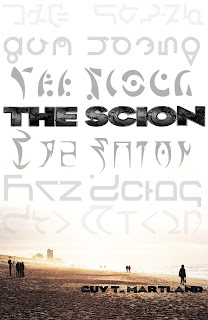I’ve met many aliens during my brief time on Earth. None to my knowledge in reality, but
many through millions of words and fictional worlds I’ve avidly consumed over
the years. These have no doubt
informed the way I’ve created aliens over the years.
It is hard to avoid cliché when creating an alien. In a
gravity different to Earth, they could be taller or shorter; their atmosphere may
be completely different; they may have completely different food sources and
will no doubt support different microbiomes which may have in turn channelled
their features. Carbon-based
lifeforms are mostly likely according to the higher echelons of SETI, but that
doesn’t mean to say other forms are unlikely. Many authors use silicon as the predominant building block,
although Silicon-based compounds are inherently more unstable, and other
elements even more so. In any case,
it seems that when considering this that they will be like us in any shape or
form. But is this strictly true?
We have seen so called biological or physical attractors in
evolution on our planet – look at how the octopus eye and human eye, have
developed independently along completely different evolutionary pathways – so-called
convergent evolution. Are
humanoids clichés or an inevitability?
I tend to think the latter.
Although this isn’t to say there won’t be other differences. Although, this is probably a
presumption based on a carbon-based lifeform, which has evolved in a similar
‘Goldilocks’ zone to Earth. This
could explain why we see so many humanoids in SF, for example in series like
Banks’ Culture.
So should aliens be feared or should we be grateful for
their presence? If aliens do ever
make contact, then they would surely be of at least a technological parallel to
ours, if not more advanced. There
is a good chance they may be able to help us out, let us piggy back off some of
their technologies, such as the McAuley’s Jackaroo. This doesn’t mean to say they won’t want something from us,
whether it be elements of our culture, or at least, a calm, focused approach to
their presence. Humanity doesn’t
have a great record when it comes to dealing with members of our own species,
let alone others. Could this be
one of the reasons why they haven’t yet contacted us?
This brings me to Fermi’s paradox, the contradiction between
the thought that given the four hundred billion stars out there in our galaxy,
there is a high probability some must harbour civilisation, so why don’t we
know about them? Is there an alien
race out there, truly to be feared, like Reynolds’ Inhibitors, which extinguish
everything as soon as it starts propagating beyond certain pre-defined limits? Have their civilisations blossomed and
died already on the vast canvas that is space and time, such as those which
created the cylinder of Rama? Is
it because we inhabit a part of the Milky Way lacking enough dark matter for
subspace transport? Or are we simply
too immature as a species, too intolerant and irrational to intelligently deal
with them?
Is it highly likely that aliens are out there, somewhere, or
maybe even moving amongst us.
Whether they will be able to help us or thwart us as a species is likely
to depend on how we react to their presence. But until they make themselves known to us, we have to rely
on conjecture, and sometimes fantasy.
In the meantime, they can make good stories and help explain elements of
ourselves, preparing us for that moment which will shake us a species, but
perhaps bring out the best in us.
References:
Banks, I. M. Consider Phlebas. Macmillan. 1987
Clarke, A. C. Rendezvous with Rama. Gollanz. 1973
McAuley, P. Something Coming Through. Gollancz. 2015
McGhee, G R. Convergent evolution: Limited Forms Most
Beautiful. Vienna Series in Theoretical Biology: Massachusetts Institute of
Technology Press, Cambridge (MA). 2001
Reynolds, A. Revelation Space. Gollancz. 2000
Shostak, S. The bricks of life: exploring the idea of alien
chemistry @ teamSETI.org. 2004
This blog post was originally written for 'Beauty In Ruins' and was posted on the 6th of July, 2015 as part of the Blog Tour for 'The Scion'.

No comments:
Post a Comment